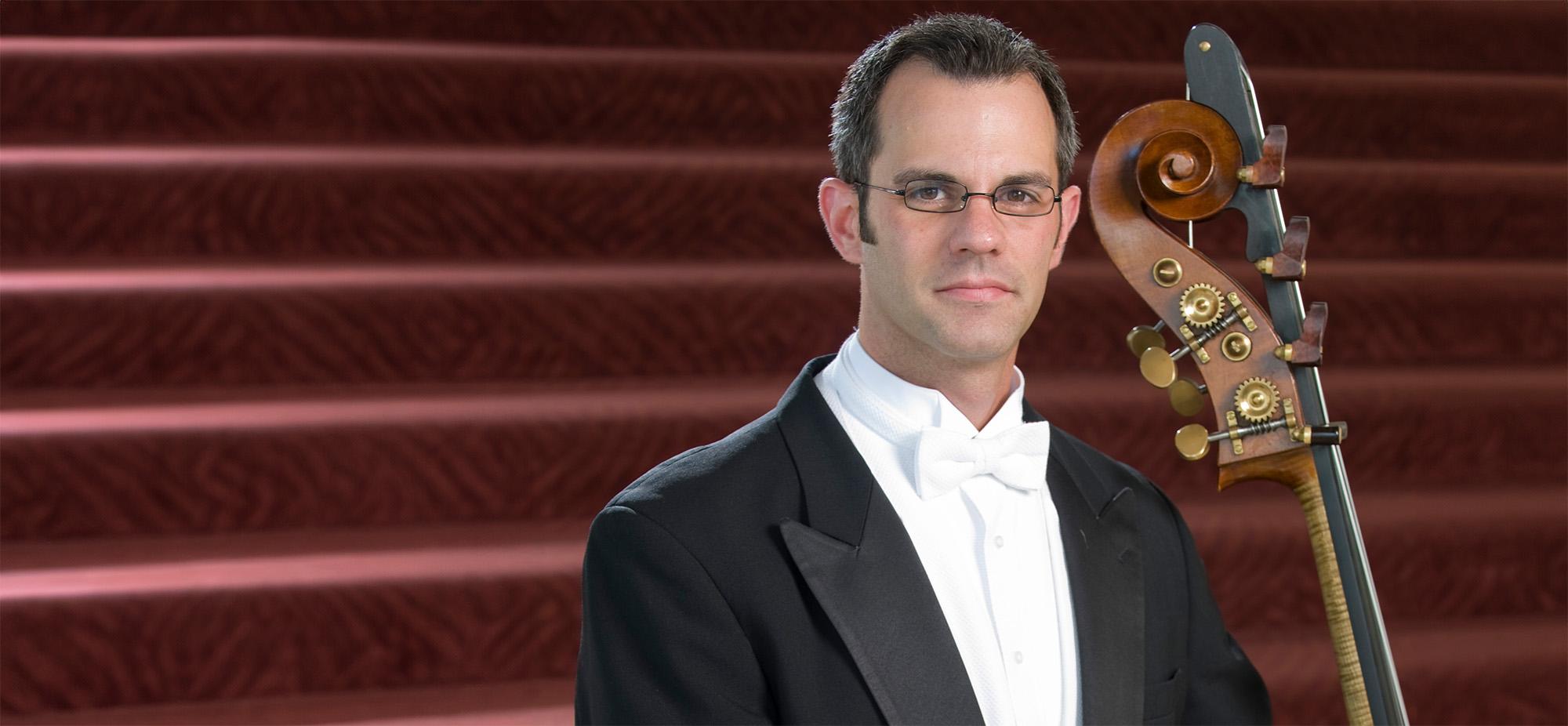December 18, 2018
Meet The SFS Musicians
Principal Bass Scott Pingel
Scott Pingel
Principal Bass
Member since: 2004
Hometown: Madison, WI
All About That Bass
Why did Principal Bass Scott Pingel take up the unwieldy, imposing instrument that anchors an orchestra from the back row?
He was fifteen and playing mostly trumpet when he heard some music that literally changed his life. “I was listening to the band Weather Report, and their bassist Jaco Pastorius played this line that hit me like a ton of bricks. I loved the tone he was making, everything about it. It was very inspiring, and I thought, ‘this is what I have to do!’’’
He began playing electric bass in funk and R&B bands, covering everything from Weather Report, to Earth, Wind & Fire, to Tower of Power.
When he decided to major in music in college, he figured he’d better learn the classical, upright bass. Plus, “I just loved the sound of it; the rich breadth and depth of tone. And every band needs a bass player! I found an old white fiberglass bass with the fingerboard broken off. I took it home and glued the fingerboard back on, and practiced it for months. My parents were so impressed with my initiative and dedication they agreed to buy me my first upright bass.”
Story continues below...
Principal Bass
Member since: 2004
Hometown: Madison, WI
All About That Bass
Why did Principal Bass Scott Pingel take up the unwieldy, imposing instrument that anchors an orchestra from the back row?
He was fifteen and playing mostly trumpet when he heard some music that literally changed his life. “I was listening to the band Weather Report, and their bassist Jaco Pastorius played this line that hit me like a ton of bricks. I loved the tone he was making, everything about it. It was very inspiring, and I thought, ‘this is what I have to do!’’’
He began playing electric bass in funk and R&B bands, covering everything from Weather Report, to Earth, Wind & Fire, to Tower of Power.
When he decided to major in music in college, he figured he’d better learn the classical, upright bass. Plus, “I just loved the sound of it; the rich breadth and depth of tone. And every band needs a bass player! I found an old white fiberglass bass with the fingerboard broken off. I took it home and glued the fingerboard back on, and practiced it for months. My parents were so impressed with my initiative and dedication they agreed to buy me my first upright bass.”
Story continues below...

Degrees from the University of Wisconsin-Eau Claire and the Manhattan School of Music followed. After a stint at Michael Tilson Thomas’s New World Symphony, he served as principal bass with the Charleston Symphony, before assuming that role in San Francisco in 2004.
Like many of his SFS colleagues, Scott devotes a lot of time to the San Francisco Conservatory of Music. He’s taught there nine years. Some of his students have gone on to win major competitions and coveted appointments with world class orchestras. “In some ways they were the easiest to teach. It’s the students that maybe aren’t as talented that are in some ways the greater challenge, but offer different kind of reward. They are the quiet victories that are almost more satisfying.”
Scott lives in Mill Valley, with his wife of fifteen years, and their two daughters. “Spending time with them is a very big part of my life. And Mill Valley is heaven on earth; it’s the most beautiful place. So many days, I think I can’t believe I live here. It’s just stunningly beautiful!”
Back to the SFS: What’s the best thing about playing in that back row? “Sitting in that sound, and being a part of its creation. We have this bias toward the hero in our culture, and flashiness and individualism, but I really appreciate my supportive role. There’s a great beauty in that. When you participate in something bigger you’re helping create this cumulative, collective beauty.”
Like many of his SFS colleagues, Scott devotes a lot of time to the San Francisco Conservatory of Music. He’s taught there nine years. Some of his students have gone on to win major competitions and coveted appointments with world class orchestras. “In some ways they were the easiest to teach. It’s the students that maybe aren’t as talented that are in some ways the greater challenge, but offer different kind of reward. They are the quiet victories that are almost more satisfying.”
Scott lives in Mill Valley, with his wife of fifteen years, and their two daughters. “Spending time with them is a very big part of my life. And Mill Valley is heaven on earth; it’s the most beautiful place. So many days, I think I can’t believe I live here. It’s just stunningly beautiful!”
Back to the SFS: What’s the best thing about playing in that back row? “Sitting in that sound, and being a part of its creation. We have this bias toward the hero in our culture, and flashiness and individualism, but I really appreciate my supportive role. There’s a great beauty in that. When you participate in something bigger you’re helping create this cumulative, collective beauty.”
